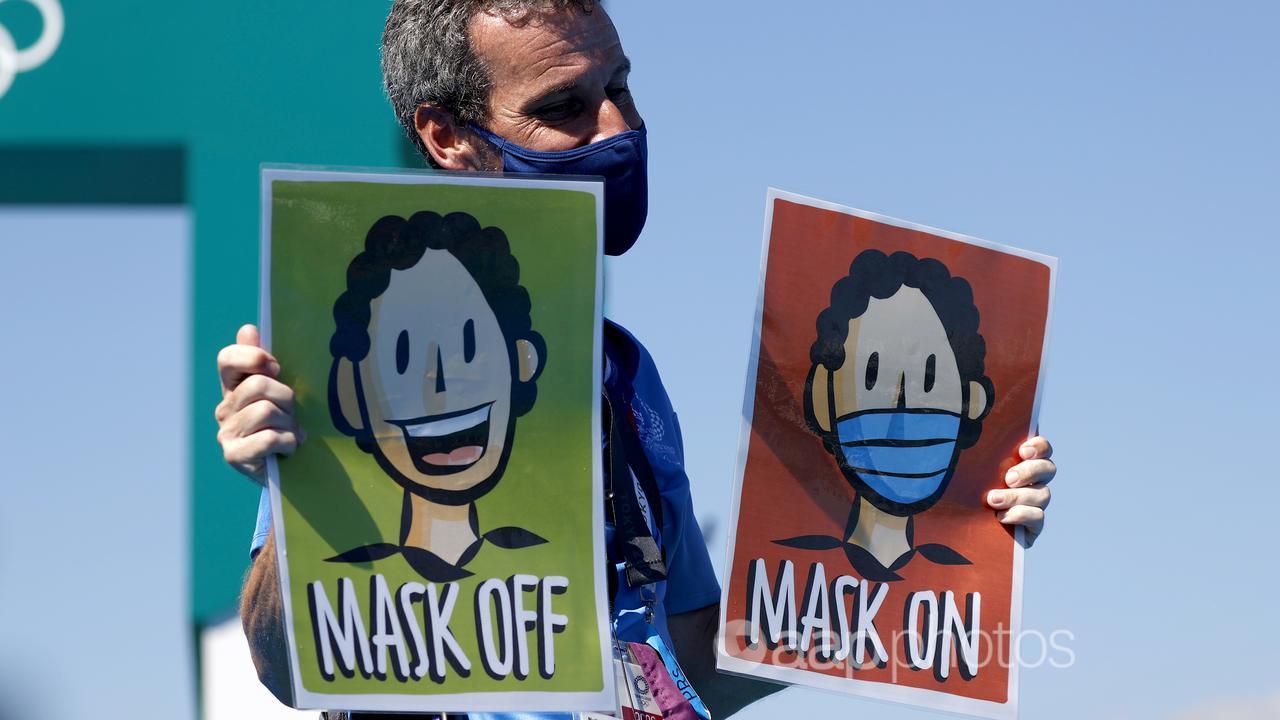As the COVID-19 Omicron variant spreads around Australia and the world, an Adelaide academic claims face masks are ineffective and lead to increased risk of other, serious respiratory disease.
But the theory flies in the face of global research and official advice that wearing masks helps prevent the spread of airborne diseases. While one expert told AAP FactCheck influenza and other diseases may increase briefly as pandemic-related restrictions lift, seasonal fluctuations in these illnesses were common.
The claim comes from a video shared online, including on Facebook, featuring academic Graham Lyons, a research associate at the University of Adelaide’s School of Agriculture, Food and Wine whose primary research focus has been on agriculture and food systems. Dr Lyons has been a vocal critic of various measures introduced to combat COVID-19 and has called the pandemic “fraudulent” and the work of a “global cabal”.
In the video, Dr Lyons says: “Face nappy (mask) wearing … they’re making people unhealthy. They’re greatly increasing your risk of other, true respiratory diseases which do kill a lot of people per annum.” (video mark 2min 55 sec)
However, respiratory disease experts say his claims on masks have no credibility. Dr Lyons did not respond when AAP FactCheck contacted him for information about the basis of his claim.
Linsey Marr is the Charles P. Lunsford Professor of Civil and Environmental Engineering at Virginia Tech university and specialises in the study of airborne transmission of pathogens. She has contributed to research into how COVID-19 spreads as well as studying the transmission of other respiratory infectious diseases (see examples here, here and here).
“There is no evidence that masks make people more susceptible to other respiratory diseases,” Professor Marr told AAP FactCheck in an email.
Euan Tovey is an associate professor at Sydney’s Woolcock Institute of Medical Research and the co-author of a study that looked at the role of aerosol spread during the COVID-19 pandemic. He also dismissed Dr Lyons’ claims.
“He is simply wrong about masks. The fact they do function so well is a small miracle,” Dr Tovey told AAP FactCheck in an email.
He said Dr Lyon’s claim about masks increasing the risk of other respiratory diseases were “vague”, and he was not aware of any evidence to support the claim.
Major health bodies such as the World Health Organisation (WHO), US Centers for Disease Control and Prevention and the European Centre for Disease Prevention and Control all advise that masks be worn to help prevent COVID-19 infection.
AAP Factcheck found no credible research indicating mask-wearing increased the risk of respiratory illnesses.
Several recent meta-analyses have indicated that mask-wearing lowers the risk of COVID-19 spread or the transmission of respiratory infections more broadly, although some also noted a lack of evidence to support the use of cloth masks (see here, here, here and here). None identified that mask-wearing could lead to higher incidence of respiratory diseases.
There have been reports that influenza, respiratory syncytial virus and other respiratory diseases increased when COVID-19 restrictions such as mask-wearing and social distancing eased in many countries in 2021.
However, that surge was likely due to the lifting of broader restrictions that had temporarily prevented the transmission of other diseases, Prof Tovey said.
“If society goes back to our old ways, then the next couple of flu seasons may be bad … but flu seasons fluctuated a huge amount prior to COVID, for a range of reasons, and so any effect of greater social isolation or masks would be hard to pin down and separate,” he said.
One German research paper claimed mask-wearing could lead to side effects like reduced oxygen levels and fatigue, however similar suggestions have been debunked by the WHO. The paper did not claim mask-wearing increased the risk of respiratory illnesses.
Prof Marr said you may end up breathing more carbon dioxide when wearing a mask, but this did not occur at harmful levels.
“We breathe in CO2 all the time, as it is present in outdoor air and at much higher levels in poorly ventilated indoor environments.”
AAP FactCheck has previously debunked various claims about face masks causing illnesses and other ill effects (see here, here and here).
The Verdict
There is no credible evidence that wearing a face mask increases the risk of respiratory illnesses, according to experts and a search of scientific research. In contrast, repeated studies and global health agencies have identified that properly worn, high-quality face masks prevent airborne diseases without impacting wearers’ health.
False – The claim is inaccurate.
AAP FactCheck is an accredited member of the International Fact-Checking Network. To keep up with our latest fact checks, follow us on Facebook, Twitter and Instagram.
Updated Tuesday, January 10, 2022 16:35 AEDT: Headline edited for clarity.
All information, text and images included on the AAP Websites is for personal use only and may not be re-written, copied, re-sold or re-distributed, framed, linked, shared onto social media or otherwise used whether for compensation of any kind or not, unless you have the prior written permission of AAP. For more information, please refer to our standard terms and conditions.


















